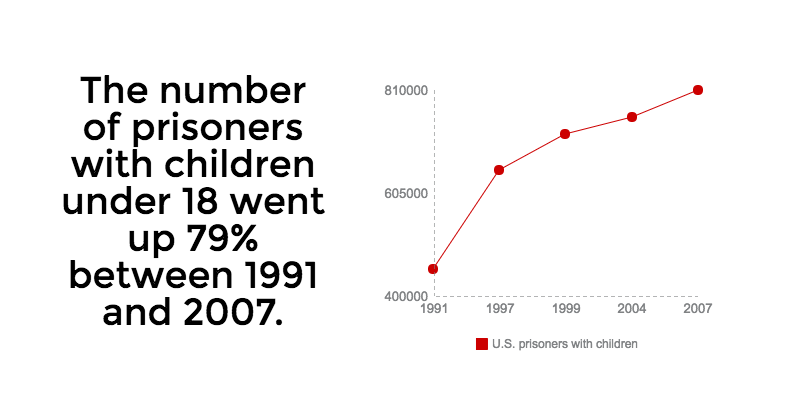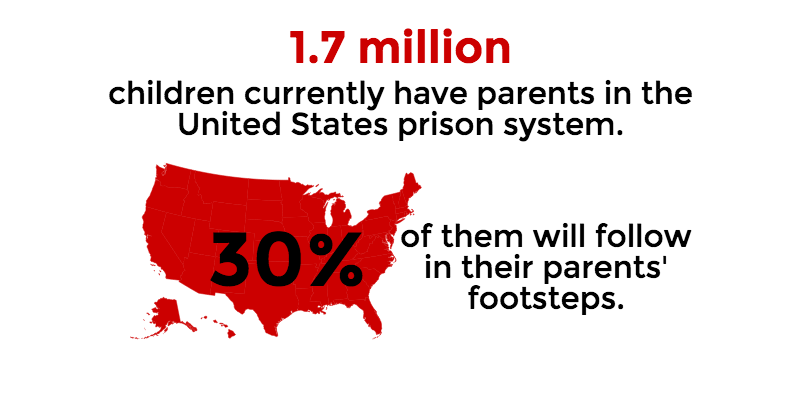One professor's fight to help the children of incarcerated parents

When I was ten years old my father, a lawyer, was incarcerated. He was what some people call a "white collar criminal" and spent two years in prison. Because I come from a loving family and because my family had other supports and privileges (i.e. we were white and middle class in a community that rewarded both), my siblings and I fared well despite of my father's incarceration. And so for a long time, decades, really, I didn't discuss my father's history. I didn't know anyone else who had had an incarcerated parent; I was in a world (the university) where nobody really discussed it; and my siblings and I had moved on. Yet, I was always aware and conscious of the plight of families and communities where incarceration was most profoundly felt. At a certain point I realized that I had to be part of the solution – or at least I owed it to others to use the knowledge I had to try to move the conversation forward. So, my co-editor and I researched and wrote Parental Incarceration: Personal Accounts and Developmental Impact.
Most of the literature to date suggests that parental incarceration can affect everything from how a child lives and behaves to how he is educated and whether or not he will someday become involved in criminal activity. Yet for various reasons, much of this literature is incomplete and under-analyzed; therefore, it does not provide an accurate picture of the impact of incarceration on families and communities.
Approximately 1.7 million children currently have a parent in prison or jail in the United States. Between 1991 and 2007 there was an 79% increase in the number of children whose parents were incarcerated. Two-thirds of women in prison are mothers and most of them had primary or some responsibility for their children beforehand. This tells us that children are affected, but it does not tell us exactly how they are affected. Furthermore, because most of the research on children and families has been conducted during and regarding the period when the parent is locked up, it does not tell us how children live and are cared for before and after a parent is in prison or jail. We know very little about how a child whose parent is incarcerated was raised beforehand, how he spends his days while the parent is in prison, and how and by whom he is cared for afterward.

So, my co-editor and I knew we wanted to hear directly from adults who could reflect upon how their parents' incarceration had affected them and who could provide us with information about how they turned out. My co-editor has worked directly with incarcerated people and their families for 35 years, which also informed our research.
What we found was that it is the constellation of life experiences – how children are raised and by whom; what level of education and employment their parents have; whether or not their parents are dependent on drugs or alcohol; whether or not they live in safe communities, etc. – that predicts how children will fare. Our research also underscores that like the race, the gender and the class of the incarcerated parent is also predictive and the effects of parental incarceration will vary with successive generations of prisoners. The stories of the thirty-five contributors who are included in our new book offer a glimpse into their developmental outcomes and their resilience. Their words also remind us that for many children a parent's incarceration is yet another adverse childhood experience heaped upon an already top-heavy list that includes poverty, inadequate housing, unsafe communities and more.
Since at least the 1980s when advocates started to talk about the increased number of parents being incarcerated and began to create more child-friendly visiting areas, children have been discussed, but there are many reasons why they are not in the forefront of our talk about criminal justice reform. For a start, because of mass incarceration people are understandably concerned with what they might consider more primary issues: the number of people incarcerated in the United States; the use of the prison or jail as a de-facto stand – in for mental health and substance abuse facilities; the length and disparity in sentencing.
Second, I think that despite a real desire to consider criminal justice reform, many of us still do not consider people in prison or jail as real people. We do not think of them as our neighbors or family member or parents. Incarcerated men and women are just 'other' people who have committed a crime, and so we might not fully or realistically conceive of their children's needs. Other reasons include the fact that the vast majority of jails and prisons do not inquire about a prisoner's parental status, so we do not know exactly how many children are out there; there is still a stigma attached to incarceration, so children and the adults they become may not talk about a parent's incarceration and this in turn contributes to the fact that we don't see the human face of it.
Criminal justice reform is gaining more and more attention in the media. People are starting to realize that the way we do things now is not working. We cannot just lock up entire swaths and generations of neighborhoods and communities and expect people to come out of prison any better than they came in. Keeping aside the very real concern that there are some innocent people in prison, the vast majority of those who committed a crime will someday leave prison and reenter our society. I think as a society we are also starting to realize that broad strokes and slogans – "three strikes"; "war on drugs"; "mandatory minimums" – are just that: broad strokes and slogans. They are not actually helpful or productive.
Provided by Boston University


















